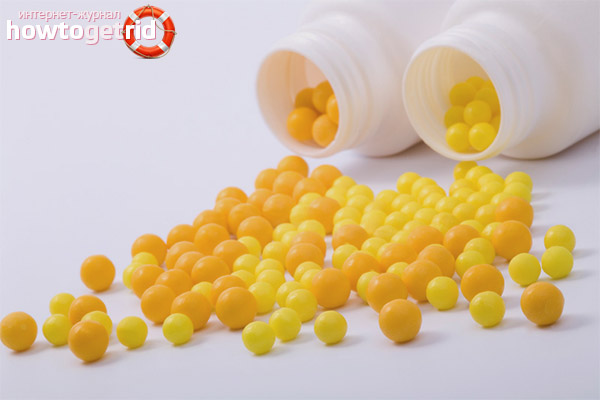The content of the article
- 1 What is the benefit of vitamin C?
- 2 When does overdose occur and how to prevent it
- 3 Precautions when taking ascorbic acid
- 4 How much per day can you take vitamin C
- 5 Symptoms of an overdose of vitamin C
- 6 Consequences of vitamin C overdose
- 7 What to do with an overdose of vitamin C
- 8 Video: overdose of vitamins and their lack
Vitamin C is a vital substance, without which the normal functioning of all internal organs and systems is impossible. It takes part in a variety of life support processes, and also contributes to an increase in the body's defenses.
In women, this element has an effect on the flow of menstruation. It is used for treatment and prevention to improve the body's resistance to the influence of negative factors. But any medicinal product, including ascorbic acid, seemingly harmless at first glance, is forbidden to be taken uncontrollably.This can lead to dangerous health problems. An overdose of vitamin C can cause intoxication.
What is the benefit of vitamin C?
Vitamin C is an important element involved in many processes that occur in the body. Lack of this element can cause adverse effects. Virtually everyone knows that a lack of vitamin C can trigger the development of scurvy, a dangerous disease that can make a person disabled. In the human body, this substance is not produced. It comes only with products, mostly vegetable - vegetables, fruits, herbs.
Vitamin C performs the following actions:
- regulation of carbohydrate metabolism;
- improving the permeability and strengthening of the capillary walls;
- participation in the development of steroid hormones;
- restoration and strengthening of immunity;
- regulation of the production of collagen;
- strengthening teeth and bones;
- helping the body to absorb other vitamins;
- participation in the regulation of blood coagulation.
When does overdose occur and how to prevent it
An overdose of vitamin C is possible only in the following situations:
- Uncontrolled use of medication. In most cases this happens with children who are attracted by the appearance of pills, and they drink them without thinking about the consequences.
- Simultaneous intake of vitamins and eating foods that contain a large amount of ascorbic acid.
- Abuse of vitamin complexes taken in the fall and winter.
The phenomenon of chronic overdose is also considered to be frequent. However, the clinical manifestations of this condition are not pronounced.
To prevent the occurrence of an overdose of vitamin C, drugs should be stored in places where children cannot get them. In addition, you need to monitor your diet. In autumn and winter, the daily menu should include a sufficient amount of fresh vegetables and fruits.
Before taking any vitamins, it is necessary to consult a doctor.
Precautions when taking ascorbic acid
The use of vitamin C with strict adherence to the dosage recommended by the doctor causes side effects in extremely rare cases.But we must not forget that there are categories of patients who take this tool with great care. The dose for them is calculated individually.
The effects of ascorbic acid overdose may occur in the following situations:
- disruption of the urogenital system;
- pregnancy (at any time);
- high blood pressure;
- the need to follow a salt diet;
- thrombosis;
- diabetes.
People who have an addiction to alcohol and cigarettes, require a high dosage of this element. A constant supply of vitamin C in a person who does not suffer from any diseases is about two grams, while those who have bad habits, it is almost completely absent.
How much per day can you take vitamin C
To prevent the development of avitaminosis per day, 30-50 mg of ascorbic acid should be consumed, for children - 20-30 mg.
The maximum permissible amount of a substance is 90 mg per day. This point should be taken into account when taking vitamin complexes, given that some products are also enriched with this element.If necessary, adjustments are made to the dose taken to prevent an overdose of ascorbic acid. Foods that contain a lot of vitamin C are citrus fruits, greens, cabbage (white cabbage, cauliflower, broccoli), sea buckthorn, tomatoes, wild rose, black currant.
For example, if there are 100 grams of cabbage (fresh or fermented), a few spoons of currant or sea buckthorn jam per day, then the need for vitamin C per day will be completely covered. With the presence in the daily menu of the listed products, in the additional intake of vitamins will not be necessary.
Attention! Increasing the therapeutic dose of ascorbic acid more than tenfold can be fatal.
Symptoms of an overdose of vitamin C
Clinical manifestations in excess of the dosage of vitamin C in people of adult age are manifested as follows:
- general malaise;
- skin rash;
- pain in the stomach;
- heartburn;
- nausea;
- dizziness;
- upset stool;
- vomiting.
With an overdose in babies, symptoms such as increased anxiety, unwarranted aggressiveness, itching, and skin rashes can occur - usually on the abdomen and articular folds.
Consequences of vitamin C overdose
With a significant overdose of this substance can cause serious complications. Among them:
- urinary tract diseases;
- malfunctions in the functioning of the pancreas, which is dangerous for the occurrence of diabetes or pancreatitis;
- gastritis or peptic ulcer;
- problems with the absorption of vitamins B, because of which there may be irregularities in the work of the central nervous system;
- the occurrence of a severe allergic reaction to ascorbic acid;
- steady decrease in the content of leukocytes in the blood;
- high blood pressure;
- failures in the process of blood clotting;
- in women of reproductive age - gynecological diseases.
An excess of vitamin C in women during pregnancy may affect the formation of the fetus. Experts believe that a significant excess of a dose of vitamin C increases the risk of spontaneous abortion.
An overdose of ascorbic acid in expectant mothers makes itself felt the following symptoms:
- pain in the digestive organs;
- deteriorated state;
- vomiting.
In addition, due to hypervitaminosis, B vitamins and some essential trace elements - copper and selenium cannot be absorbed, which has a negative impact on the development of pregnancy.Expectant mothers should not abuse vitamin complexes, since their surplus can provoke fetal abnormalities.
What to do with an overdose of vitamin C
When ascorbic acid gets into water, it dissolves completely, due to which the kidneys quickly remove it from the body. If a person suspects that there has been an overdose of vitamin, then he should immediately cancel the reception of all funds and use large amounts of clean water.
If a one-time use of increased dosage of vitamin C (more than 20 g) has occurred, it is necessary to carry out a gastric lavage as quickly as possible in order to provoke vomiting. Then you should take any absorbent available in your home medicine cabinet, for example, activated carbon or enterosgel.
It is necessary to use a large amount of liquid so that excess ascorbic acid is faster out of the body.
So, vitamin C is an important substance for preventive measures against infections during outbreaks of diseases, for maintaining the immune system after suffering diseases, as well as for those who have bad habits - smoking and alcohol abuse.However, uncontrolled intake or a long excess of the dose prescribed by a doctor can lead to dangerous consequences.
Any vitamins should be taken only in the dosage that is prescribed by a specialist, and also to prevent children from eating vitamins without the supervision of a parent. This will avoid overdose and dangerous consequences.
Video: overdose of vitamins and their lack












To send